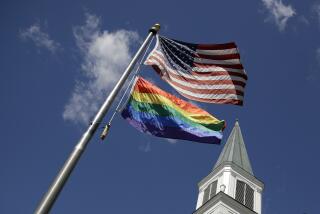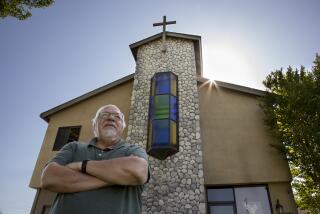Protestant Churches Making Progress on Unity : Grand-Scale Plan Now Taking New Tack Toward Loosely Knit Confederation
NEW YORK — Now at its 25-year mark, a grand-scale plan to unite American Protestants still is moving ahead, but on an altered tack that seeks a loosely knit form of unity.
Participating denominations for the last two years have been evaluating a preliminary draft of the proposal, called “Covenanting Toward Unity,” and submitting responses to it.
“So far, they’ve been quite promising,” said the Rev. Gerald L. Moede, general secretary of the Consultation on Church Union, with offices in Princeton, N.J.
Favorable Responses
While the responses include criticisms, suggested changes and questions, he said in a telephone interview, the general view expressed is that the new approach offers a workable, unifying way.
“It is being taken seriously,” he said. “We’re quite optimistic.”
The group’s executive committee met this month and directed that a revised text be prepared for consideration at a full meeting of denominational representatives scheduled late next year.
The nine denominations involved, with a total membership of 23 million, include the United Methodist Church, Presbyterian Church (USA), Episcopal Church, United Church of Christ, African Methodist Episcopal Church, African Methodist Episcopal Zion Church, Christian Methodist Episcopal Church, Christian Church (Disciples of Christ) and International Council of Community Churches.
Pursuit of Unity
All of them, in their pursuit of unity, have recognized the baptisms of the others.
When the effort began April 9, 1962, only six denominations were involved, exploring establishment of a united church that would be “truly catholic, truly evangelical and truly reformed.”
Since then, three other denominations have entered the quest.
The goal initially was structural merger, and a plan for it was drawn up and submitted to the denominations in 1970, but they did not go for it.
Such mergers have occurred steadily around the world, 65 of them since 1925, usually within denominational families such as a broad Lutheran merger scheduled to take place on Wednesday in Columbus, Ohio. That is the opening day of the constituting convention for the new Evangelical Lutheran Church in America, formed from the Lutheran Church in America, the American Lutheran Church and the Assn. of Evangelical Lutheran Churches.
Conversations Continue
Conversations looking toward 35 other such mergers are going on in various countries.
That pattern did not suit all the Consultation on Christian Union denominations. “It seemed to apply a top-heavy, hierarchical kind of structure,” Moede said. “They wanted some other form.”
Denominational representatives then took up a new vision for unity called “covenanting,” and in 1984 adopted what for it was considered a breakthrough theological consensus that the denominations now are weighing.
Two of them have approved it, the relatively small International Council of Community Churches and the mainly black Christian Methodist Episcopal Church.
The consensus covers basic matters of church life such as confessional beliefs, ministry, membership and worship. Five other denominations expect to act on it in 1988, the other two in 1989.
Refining the Proposal
With the doctrinal basis under consideration, work has turned to refining the covenanting proposal by late 1988 before it also goes to the denominations for formal action, putting the whole package before them.
Moede said the covenanting approach will involve “unity in essential things, but with the present structures still in place, and with a lot of diversity in traditions.”
“There would be a common expression of faith, complete fellowship at the Lord’s table, a mutual recognition of memberships and ministries and a commitment to do mission together,” Moede said.
“There has been a lot of duplication and competition in that area.”
The executive committee of the Consultation on Christian Union at its April meeting issued a summary of what covenanting would mean, declaring:
‘Unity in Sacred Things’
“It is a unity in sacred things: faith, baptism, Holy Communion, lay and ordained ministries and mission. . . .
“In a solemn act, the churches will ask God’s spirit to create out of their separated life a new community for the sake of all people. . . .
“Each church will gain a new sense of life in a community of faith that is fully catholic, evangelical and reformed.
“The ordained ministries will be both recognized and reconciled, and then live in such unity that all future ordaining will be for one ministry in Jesus Christ. . . .
“Covenanting will mean, at least for the present and until each church may decide otherwise, maintaining present structures, traditions, systems of placement, forms of worship and mission programs.
“All else is left to God’s spirit and future.”
More to Read
Sign up for Essential California
The most important California stories and recommendations in your inbox every morning.
You may occasionally receive promotional content from the Los Angeles Times.










